I recently thrust myself back into my own genealogy research. It’s good for me. When I feel connected with my loved ones of the past, I feel much happier.
It’s not like I hadn’t been doing genealogy research before, but… well… for me, Czech genealogy is just one single very deep rabbit hole, like scope creep that never, ever ends. I started in 2008 with my Texas Czechs, then it led me to grad school in applied linguistics. I’m also writing a book about Czech land records, and I’m learning Czech, and I’m on the executive committee of CGSI, and and and and and…
And, well, I’ve solved my direct ancestors’ villages of origin already.
But genealogy is a never-ending sandbox. Even those morons people who think that their lines “go back to Adam and Eve” – well, guess what. You’re not off the hook so easily. There’s plenty of other lines that definitely are not.
Anyway, I came up with a schema for solving villages of origin problems for all my Czechs. It goes like this:
Level 1: my own immigrant grandparents (when I say “grandparents”, I mean great great grandparents)
Level 2: spouses of children of my immigrant grandparents
Level 3: spouses of siblings of immigrant grandparents
Level 4: spouses of children of siblings of immigrant grandparents
And yeah, there’s also a level 5. But it’s not really on the agenda yet per se.
Level 5: Spouses of children of children of immigrant grandparents
In this journey, so far I have discovered 50 ancestors whose villages of origin remain “unsolved” (at least, as per their records on FamilySearch, which is where I do all my research for lots of reasons, but mainly because I’m a person with limited time and this gives me and my descendants the greatest ROI). I realize that I will likely run into others to find along the way, so I’ve started to take brief snapshots of what this looks like. I’ve arranged these people by alphabetical order of the village of origin as given by FamilySearch. Here’s what that looks like as of 4/15/20:
| “Boltin, Austria” | 1 |
| “Moravia” | 1 |
| “Switzerland” | 1 |
| France | 1 |
| Mesekow, Prussia | 1 |
| Mongrovie, Prussia | 1 |
| “Germany” | 2 |
| “Poland” | 2 |
| “Prussia” | 2 |
| “Czechoslovakia” | 3 |
| “Austria” | 5 |
| ? | 30 |
| Total: | 50 |
Definitely none of them came from “Czechoslovakia.” This is 1880 and earlier.
And those 30 completely unknown? Well, that’s the adventure/challenge!
I’ve never ever done any research on Prussian or French ancestors before. Remember, these are not my direct lines. But they are connected to me.
One line stood out to me, and I’m not exactly sure why. It’s… well, they are related, but it’s pretty distant. And I’m quite sure this will make you laugh, but whatever, I’ll just spit it out right away and be done with it. I was researching the second wife of my third great uncle. I wanted to find her ancestral village of origin; she was born in the United States, so that meant looking at her ancestors.
Her father was Desiderius Lutringer. Awesome genealogy name.
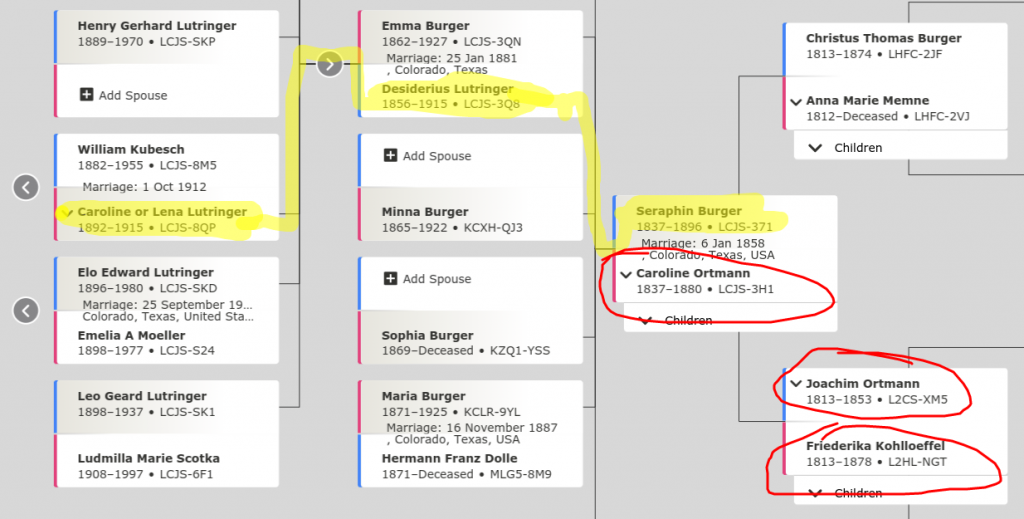
Desiderius seems to be from the Alsace region of France. According to FamilySearch, he was born in Texas. But that doesn’t seem to be correct.
Desiderius’s father, Seraphin Burger (Yet another awesome genealogy name! It must run in the family) was also from the Alsace region. I don’t know much about him, except that he seems to have married Caroline Ortmann. She was also an immigrant, but from “Boetzow, Brandenburg, Prussia.”
This is what I get when I google that place:
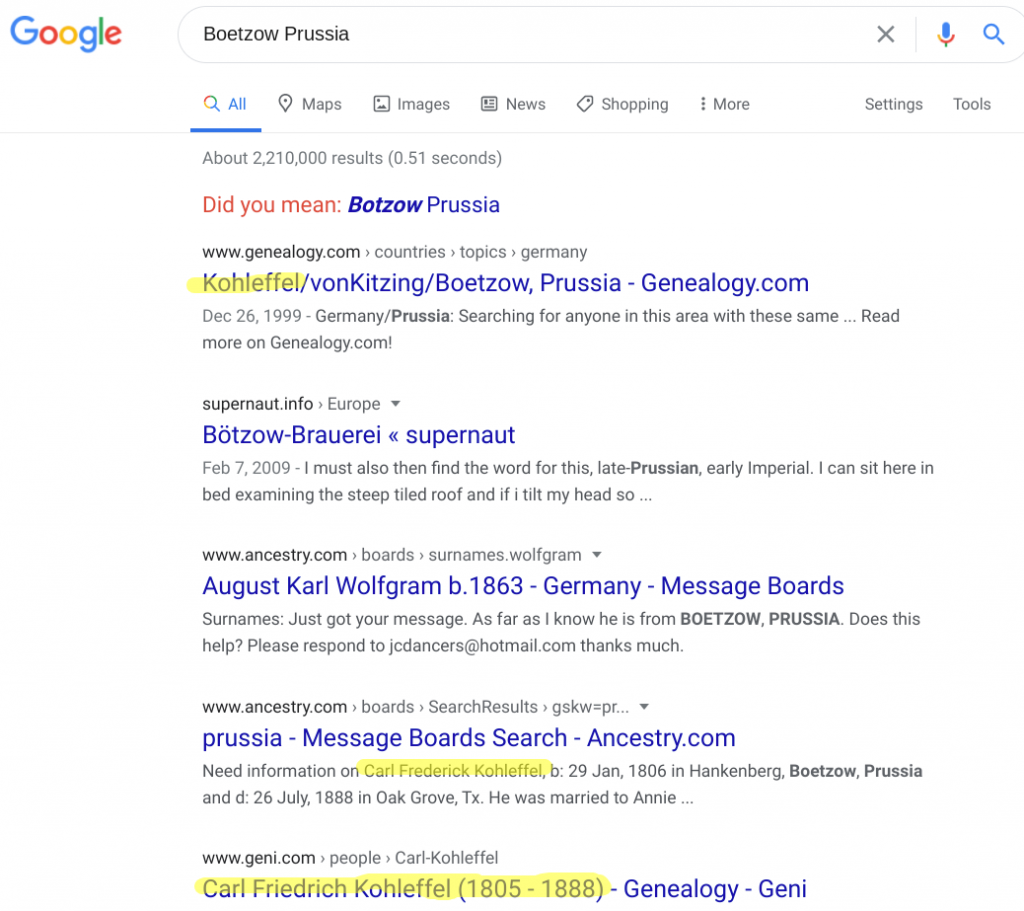
First four hits matching the family I’m searching for (Kohleffel). Hmm. I’m not sure google’s algorithms are advanced enough yet to know this. Also, it’s highly suspicious that the first hit is for a genealogy website. It makes me super suspicious of this place name.
For a while I tried reading about Bötzow, Prussia, but I got really easily distracted while playing around in their tree when I found that there was a Czech person missing their village of origin.
Let’s be honest: I’m not very likely to find the Prussian or French villages of origin without a lot of time and investment on a brand new learning curve. It’s interesting, but… But the Czech village of origin questions are really what’s fun. I wasn’t even originally sure I was going to include any non-Czech village of origin questions in my list of 50, to be honest. But Prussia is close enough that conceivably it could actually be a Czech village of origin. Or, well, that’s what I told myself at least. The proof will be in the pudding.

Just messing around in the tree, seeing how this family fits together, I found that there was this lady named Franziska. When I clicked on her name…

… it was like, “Oooh! Is that a challenge?!”
Colorado County was (and is) crawling with Czechs. It’s right next to Wharton and Fayette counties, where most of my Czechs were from. The experience of going to a Czech cemetery in that area is like… I feel like I’m related to every single person there. All of the surnames are on my family tree.
This Franziska was from “Böhmen”, though. So that would be an even more fun challenge, since that probably meant Bohemia rather than Moravia. All my own ancestors are Moravian (well, or Wallachian/Silesian, but who wants to quibble).
I was going to look for more records for this Franziska, but then I thought to myself, “Psshh. This is really far removed from me. Maybe I should focus back on Desiderius.”
After all, Franziska Zeiner is my third great step aunt’s grandpa’s second wife’s mother. And I think that is the most precise way to say our relationship, too, since if you said she was my third great step aunt’s step grandma’s mother, it leave some ambiguity to where the “step” is.
I mean, that relationship is a little bit ridiculously far, even for me.
So I started searching for Desiderius in the census records. I couldn’t find him in the 1880 census for some reason, and with a name like “Desiderius”, I was kind of surprised. I thought he might be in Frelsburg, Colorado County, and so I started to just manually search the census. There are only 69 pages for that town – it’s the only way to be sure I wouldn’t miss him. You know, you’d think names like Desiderius are good, but it turns out there are a ton of ways to misspell it. Kinda like my Rainošek ancestors. Reinecheck? Ugh. And the search engines on the major genealogy sites still seem to not inform themselves off Czech phonemes. So that’s just irritating. They probably are unlikely to, since Czech is just such a tiny representative portion of the population. Humph.
On page 22 of my page-by-page search in the 1880 census, I ran across Carl Zeiner.
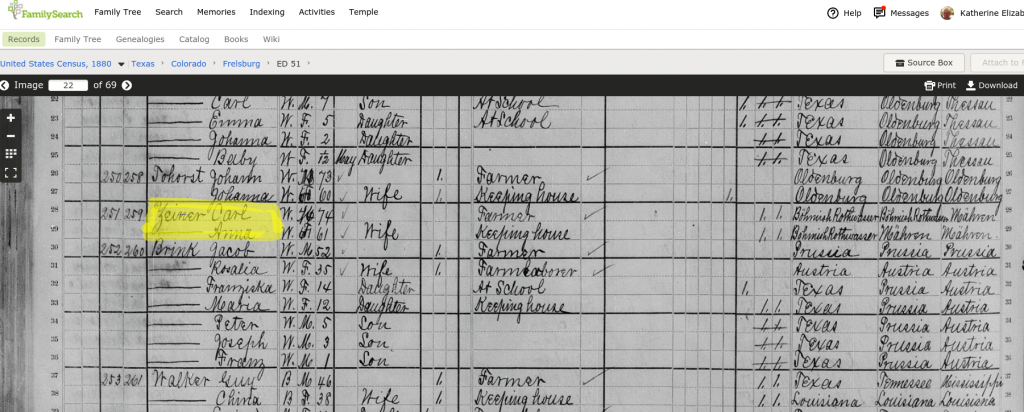
I remembered that Franziska Zeiner’s father was named “Charles” in FamilySearch. I was immediately really intrigued.
I looked a bit more closely at the census, and was completely shocked.

I gave a presentation for CGSI two years ago about how to find your Czech village of origin. I had to reverse search the US census to come up with an example for my presentation, and it was actually kind of a pain. I never expected to find this for my own… uh… very distant family.
But well, first I’d have to see if the records really panned out.
I did a quick search for “Rothwasser”, considering that maybe Böhmish was some kind of generic adjective (spoiler: that turned out to be a mistake).
When I searched for Rothwasser, I got Červená Voda in Ústí nad Orlicí district.
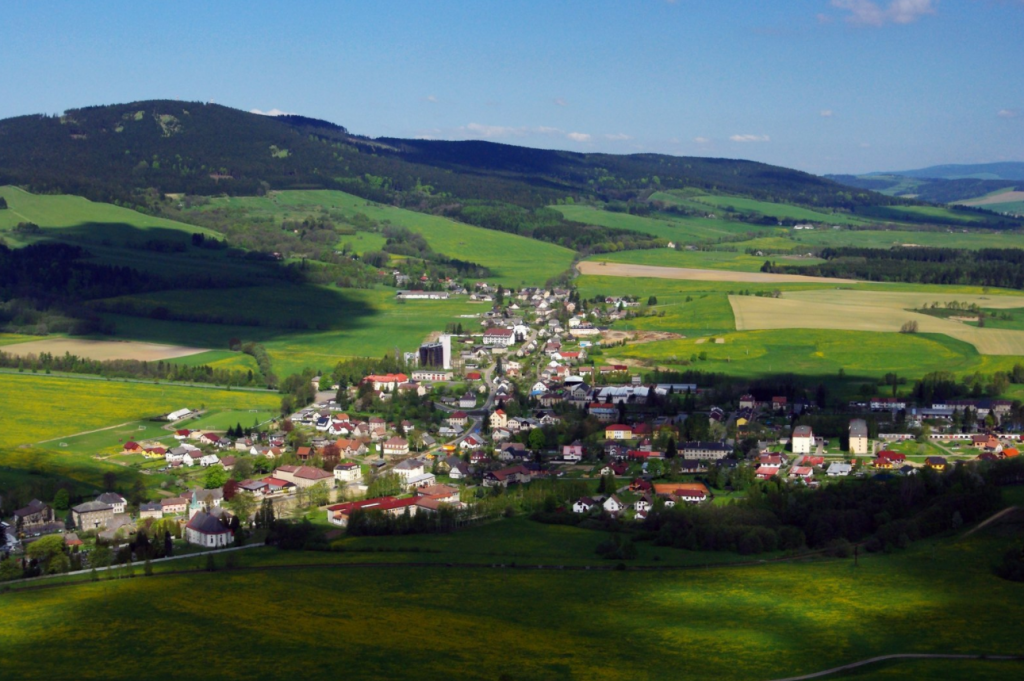
Just one glance at the map and I could tell… ugh…

… Zámrsk. Ugh.
Zámrsk Regional Archives (SOA Zámrsk) does things completely differently from the other 7 SOA’s. They make you navigate through a giant PDF of all the scanned matriky, and then you download a zip file of images in order to view them. I mean, there’s pros and cons to this approach. It’s a lot faster when you finally get a book that you want.
But for a problem like this, it’s annoying.
But I wasn’t going to give up.
So to make a long story short, I downloaded the wrong Červená Voda zip folder at first because I was just assuming, stupidly, that there was only one.
You never should assume that in Czech research.
When I couldn’t find her, I went to genteam.at, one of the best current gazetteers for Czech genealogy (but that’s a super low bar! This one doesn’t even have Czech diacritics! Sigh.)

Hmm, maybe that Böhmish wasn’t just superfluous after all.
Since there was only one Rothwasser in Bohemia, I decided to start with that one.

It took my pitiful WiFi connection a really long time to download that folder. I was really antsy to see if the record was there. I quickly flipped to the birth date given in FamilySearch.

And I found her immediately!
There she is, daughter of Karel Zeiner, a Catholic day laborer, son of the deceased Johann Zeiner, Hausler in #420 and his wife Judith born Jiruntsch? of #7, of J??? [is that Judith’s father’s name?], both from the Landskroun Herrschaft, from here [aka from Dolní Čermná].

Best part about this record? There was a note about her emigration!
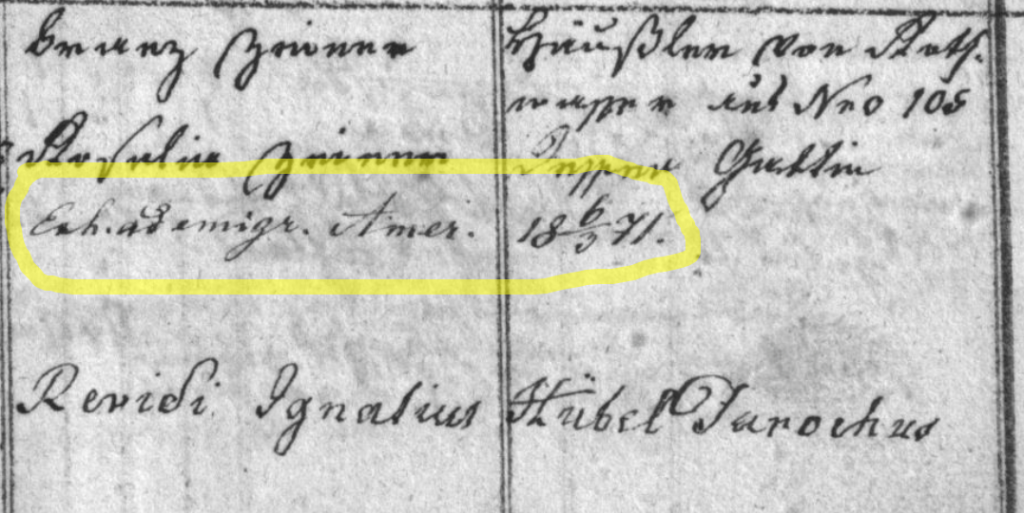
And it matches the date when she is said to have emigrated in the 1900 and 1910 censuses (at least, it matches the 1871 bit. This even suggests she emigrated in March of 1871!).
So that’s just awesome. I am really, really happy about this find.
I can’t wait to input this information into FamilySearch, and for some living descendant to look up one day and notice that their lines have suddenly been extended over across the pond, effectively opening up an entire new set of records, linking generations that were previously thought to be unknowable.
I know what it feels like to face those unknown generations. It’s how I feel looking at these Prussian and French lines. I don’t really know how to proceed, which archives to check, and whether or not the records really will be available if they even exist.
For the Prussian problems, know that I should start by looking at FamilySearch wiki and engaging in a discussion with an online community somewhere (maybe FamilySearch community is a good place to start, but it just kinda depends on the climate of the region. Maybe there’s a really active Prussia Genealogy Facebook group). Most likely the records do exist somewhere. More and more records become available online every single day, so it’s possible that I will be able to find what I’m looking for.
It feels so good to solve this kind of problem. It’s wonderful.
